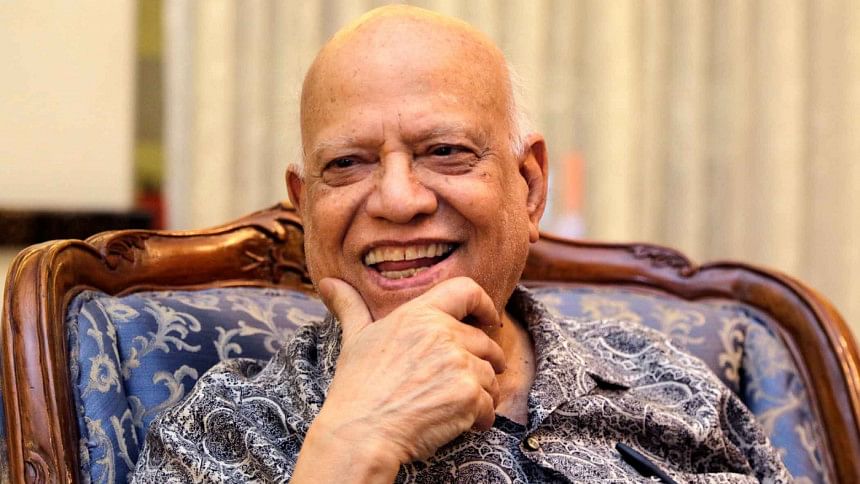AMA Muhith: A few glimpses into the man

For quite some time, I haven't been writing for national media outlets for reasons which I may share someday, if I think that would make any positive difference in the existing ecosystem of freedom of expression and journalistic values and ethics in Bangladesh. However, I have been quite humbled to have been warmly accepted in some of the leading international and regional media outlets, which include Project Syndicate, World Economic Forum, Straits Times (Singapore), South China Morning Post (Hong Kong), Nikkei Asian Review (Japan), Bangkok Post (Thailand), and in India, the Hindu and Times of India. BBC World Services also occasionally interviews me for comments and opinions.
This is where I can't help but recall with gratitude the constant support and appreciation that I received from a gentleman who has been a great source of encouragement in my intellectual endeavours, both within and outside Bangladesh. He is none other than the late Abul Maal Abdul Muhith, former finance minister of Bangladesh who left this world on April 30, 2022.
Given that my father, late Syed Amir Khasru, was Mr Muhith's contemporary in civil service, and because of family links on the side of my mother, Najma Khasru, who hails from Sylhet, I used to call him Muhith Chacha. I would like to offer a few glimpses of this gentleman that many, who were in close contact with him, may already know, while others may feel inspired from the examples he had set during his illustrious career.
In spite of his career as an accomplished civil servant and then a politician with the resulting power and privileges that came along with that, one thing that never changed was his unbridled simplicity and honesty in whatever he chose to do or cared to say. His instantaneous, full-face smile would lighten up the room, even on the cloudiest of days, just as his occasional outbursts of irritation and anger would last for a few minutes before returning to that grinning face again. In a civil service which, over the years and in many instances, has seen a growing culture of power abuse, politicisation, polarisation, and weak work ethics, he was a refreshing reminder of what civil service and leadership at the national level are supposed to be.
On corruption, with his characteristic simplicity, he would state, "I don't understand why a government official would be corrupt when their salary has gone up and there are so many perks, privileges, and power they enjoy which, if converted into cash, makes the salary many times more than their basic salary." It was a simple, frank obversion. The reality, sadly, is hard.
He had an amazing memory which most of us would be envious of. From what happened during the Language Movement of 1952 to who said what during those momentous historical events, he was like a walking encyclopaedia of knowledge, wisdom, and insights. His ability to recall dates, names, and quotes was mind-boggling, as was his penchant for constant learning, reading and writing even in his mid-80s. His most-treasured assets were not any physical or material possessions, but his collections of thousands of books gathered over a lifetime. What many do not know is that for a good part of his life, he lived in solitude with only his books—the one constant companion that never left him, nor did he leave them till his last breath. He used to say, "Someday when you may not be around, your writings will outlive you."
On October 10, 2017, I had the privilege of leading the international knowledge outfit The Institute for Policy, Advocacy, and Governance (IPAG) to organise an international event in New York, showcasing Bangladesh's success in achieving the MDGs, in partnership with the Economic Relations Division (ERD) of the finance ministry. This was the first time that a private think tank and a government entity collaborated on an international event held next to the UN headquarters, and in participation of leading multilateral development agencies, think tanks and academia, including the UN, World Bank, Brookings, Harvard University, Stanford University, University of Pennsylvania, Columbia University, etc. It was because of Mr Muhith's support and confidence in us that we could organise such a prestigious event for Bangladesh in one of the world's most well-known cities.
While the IPAG has been soaring into global heights, he was one of our genuine well-wishers. He used to tell me, "The reason IPAG is rising internationally is because of the low profile you maintain locally and your ability to do things that meet global standards, which very few can do in this country." We have tried to live up to his expectations. For example, while Bangladesh is not a member of G20—the 20 most politically and economically powerful nations of the world—IPAG has written nine policy briefs for the G20 Leadership Summits from 2017 to 2022, and I personally have been privileged to be the only person who is the co-chair of two G20 Task Forces, i.e. SDG and Digital Transformation under the G20 Indonesian Presidency 2022. For G20 Presidency 2023 under India, we already are in close consultation with the country's ministry of external affairs on how we can play a positive role during its G20 presidency. Similarly, for COP26 in Glasgow, I was among the few invited by SDG Action under UN SDSN to write for the climate action edition by leading global thinkers to help set out priority action for COP26, and I wrote about how digital revolution can help tackle climate change.
In the same spirit, when Mr Muhith attended meetings of the World Bank, IMF, Asian Development Bank, etc, in many instances we made short policy briefs for him to read during the flight. Although he had official summaries made by his ministry, these insightful notes provided perspectives on a whole range of issues that were of significance. While many people of power and position in this country praise the quality of our work in the international arena, hardly anyone has cared to use our global outreach and expertise for supporting the country, as we would neither serve their own interest nor do business as usual. In Mr Muhith, we had someone who understood the value of professional excellence and international as opposed to local standards; his selfless appreciation of our work has been an inspiration.
Last but not the least was his humility. On one such occasion, there was a dinner at my place where Mr Muhith confirmed his attendance. On the day of the dinner, his private secretary called to say that there was a family programme in the evening on occasion of his birthday, which had been inadvertently overlooked, and that he may not be able to attend the dinner. I told him that it was too late to call off the dinner, as most of the invitees had already confirmed their attendance, including heads of some of the diplomatic missions and development agencies. Putting aside family commitments, he came to my home for dinner at 8:00pm, and was there until 9:30pm, keeping his family members waiting. I doubt if many in his place would have done the same. He was true to his commitments and respected people, no matter how big or small, older or younger.
In this era of social media and digital revolution, when we are more connected than ever before, we are sadly getting increasingly disconnected from principles and values like honesty and integrity, simplicity and humility, decency and grace. Mr Muhith has been an embodiment of these finer qualities which we need so badly today. May God reward him for the good examples he has left behind to be inspired from, no matter what position and resulting power we may be privileged to enjoy. Adios to a gentleman whose wisdom and goodness will be missed.
Prof Syed Munir Khasru is chairman of the international think tank Institute for Policy, Advocacy, and Governance (IPAG), and a faculty member at the Institute of Business Administration (IBA), University of Dhaka.

 For all latest news, follow The Daily Star's Google News channel.
For all latest news, follow The Daily Star's Google News channel. 



Comments